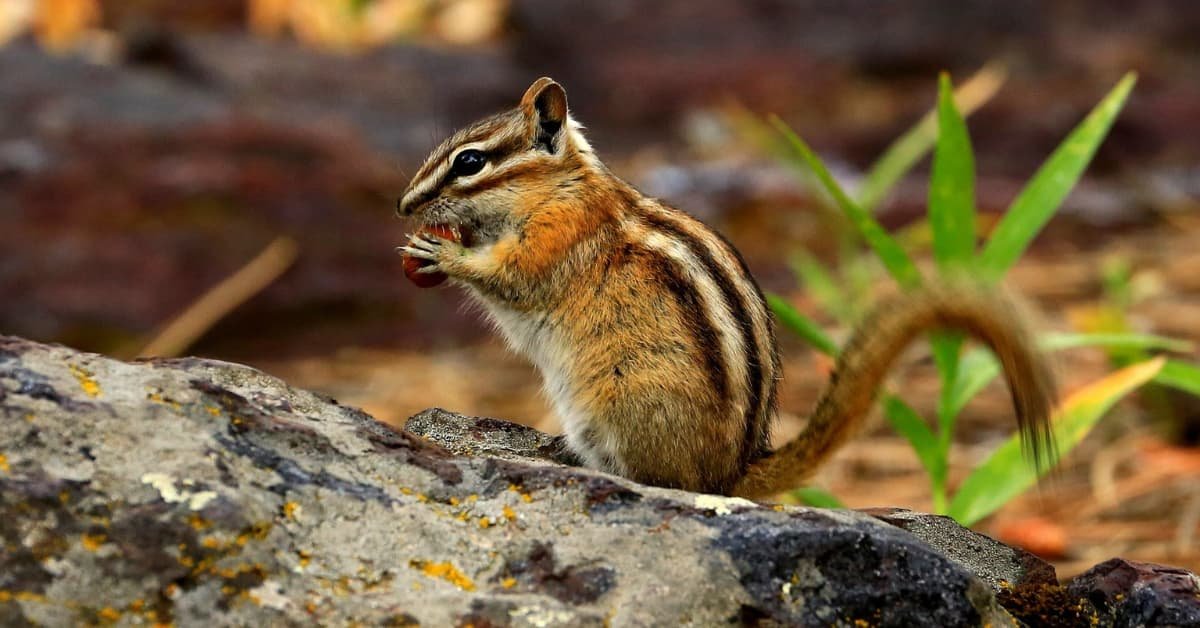
Chipmunks are small, furry rodents that are found in forests and grasslands throughout North America. These critters are known for their playful and energetic nature.
They are also known for their unique vocalizations and distinctive stripe patterns. Despite their adorable appearance, chipmunks face many challenges when it comes to survival in the wild.
In this article, we will explore “How long do chipmunks live” and the habits of chipmunks. This includes their reproductive cycle, food and water sources, habitat, and behavior.
Short Summary
- Chipmunks have an average lifespan of around 2 years in the wild but can live up to 11 years in captivity.
- Chipmunks reach sexual maturity at 1 year old and mate 12 times yearly, with an average litter size of 4-5 young.
- Chipmunks need water and food to survive, with a daily water intake of around 30-60 mL. They also have the ability to collect up to 165 acorns in one day.
- Chipmunks prefer to live alone and are adaptable. They survive in different habitats varying in size depending on food availability.
Life Cycle and Reproduction
Regarding “how long do chipmunks live” and habits, it is important to note their breeding habits and growth stages.
Chipmunks reach sexual maturity at the age of one year, and they mate 12 times annually.
The gestation period lasts around a month, resulting in an average litter size of 4-5 young.
Newborn chipmunks are born hairless, helpless, and blind, resembling the size of bumblebees.
They rely on their mother for nourishment and protection until they are able to fend for themselves.
As chipmunks grow, they reach the peak of adulthood at 7-9 months. They grow up to 8-10 inches in body length, including a tail that’s 3-4 inches long.
During this growth stage, they are vulnerable to predator attacks. It is one of the top reasons why chipmunks don’t live for many years.
In the wild, they struggle to survive against harsh and fluctuating environmental conditions.
Chipmunks can become hosts to mites, lice, and ticks and can carry Lyme disease and other tick-associated illnesses.
They also suffer from cheek pouch infection, skin diseases, pyometra, cystitis, and leptospirosis.
Environmental Factors
Environmental conditions like available food, predation, and climate play a big role in determining how long chipmunks live in the wild.
In areas with abundant food sources and lower predator populations, chipmunks are more likely to survive and live longer.
However, as habitat destruction and climate change continue to impact chipmunk populations, their survival rates may decrease.
Habitat destruction is a major threat to chipmunks as it disrupts their natural food sources and burrow systems.
Climate change also poses a threat as it alters the timing of seasonal events, such as the availability of food sources and the timing of hibernation.
These environmental factors can have a significant impact on chipmunk populations and their ability to survive in the wild.
To ensure the continued survival of chipmunks, it is essential to address these threats and work to preserve their natural habitats.
Food and Water Sources
The availability of food and water sources is crucial for the sustenance of chipmunks. Chipmunks have high metabolism rates, which means they need to eat frequently to survive.
They consume a variety of foods, including nuts, seeds, berries, insects, and small invertebrates. They also need access to clean water to drink and clean their bodies.
Chipmunks typically drink water twice a day and require around 30-60 mL per day. Without water, they can only survive for 2-3 days.
Chipmunks have foraging habits that are essential for their nutrition requirements. They are known to collect large amounts of food, particularly nuts, and seeds, which they store in their underground burrows.
A single chipmunk can collect up to 165 acorns in just one day. This behavior helps them prepare for the winter when food sources may be scarce.
In addition, chipmunks are opportunistic and will eat whatever food is available in their habitat. They are also known to eat bird eggs and insects.
By having a diverse diet and foraging habits, chipmunks can ensure they have enough food to sustain themselves throughout the year.
| Nutrition Requirements | Foraging Habits |
|---|---|
| Chipmunks need a variety of foods to survive, including nuts, seeds, berries, insects, and small invertebrates. | Chipmunks have foraging habits that are essential for their nutrition requirements. They collect large amounts of food, particularly nuts and seeds, which they store in their underground burrows. They are also opportunistic and will eat whatever food is available in their habitat. |
| Chipmunks require access to clean water to drink and clean their bodies. They typically drink water twice a day and require around 30-60 mL per day. | By having a diverse diet and foraging habits, chipmunks can ensure they have enough food to sustain themselves throughout the year. They are also known to eat bird eggs and insects. |
Habitat and Behavior
Chipmunks are adaptable creatures that can survive in a variety of habitats, such as forests, meadows, fields, and parks with nut-producing trees.
They prefer to live alone, but they are adaptable enough to survive in different habitats.
A chipmunk’s home range includes its burrow or dominant area, which protects against invaders.
Burrow construction is a crucial aspect of a chipmunk’s habitat and behavior.
Burrow construction is a skill that is passed down from generation to generation.
Chipmunks use their sharp claws and teeth to dig and construct their homes.
Chipmunks also display social interactions, especially during mating season, when they come together.
Yet, they are generally solitary creatures and prefer to keep to themselves, focusing on activities such as eating, drinking, storing food, burrowing, and escaping predators.
Common Diseases and Predators
Common diseases and predators pose significant threats to the health and survival of chipmunks.
As mentioned earlier, chipmunks can contract various diseases such as cheek pouch infection, skin diseases, pyometra, cystitis, and leptospirosis.
These illnesses can cause severe health problems and in some cases, lead to death.
Additionally, predators such as snakes, hawks, owls, and domestic cats can significantly reduce the population of chipmunks in certain areas.
The impact of these predators can have a cascading effect on the ecosystem since chipmunks play a vital role in the food chain as seed dispersers.
Preventative measures can be taken to reduce the impact of common diseases and predators on chipmunks.
Maintaining a clean environment can help prevent the spread of diseases while keeping domestic cats indoors can reduce the number of chipmunk fatalities.
Additionally, providing natural habitats such as wood piles, brush piles, and nesting boxes can help chipmunks evade predators.
A healthy population of chipmunks in an ecosystem can promote biodiversity and provide a food source for larger predators, which highlights the importance of protecting these small rodents.
FAQs:
How do chipmunks communicate with each other?
Chipmunks communicate with each other through a variety of vocalizations, such as chirps, trills, and chatters. They also use scent markings to communicate territorial boundaries and reproductive status.
What is the difference between male and female chipmunks?
Male and female chipmunks have reproductive differences. Males have larger testes and produce more sperm, while females have larger ovaries and can have multiple litters per year. Sexual dimorphism is also evident in body size and coloration.
Can chipmunks swim?
Chipmunks have limited swimming abilities and can only swim short distances. They prefer to live in habitats with access to water sources such as ponds, lakes, and rivers, but they primarily rely on their burrows for safety.
Are chipmunks territorial and how do they defend their territory?
Chipmunks are territorial and use vocalizations, scent marking, and physical aggression to defend their home range and burrows. They may also engage in tail-flagging and chasing behaviors to intimidate intruders, exhibiting a variety of effective defense mechanisms.
What are some unique adaptations that chipmunks have for survival in the wild?
Chipmunks have adapted to survive in the wild through their behavioral patterns and dietary preferences. They store food for the winter and fiercely protect their burrows. Chipmunks are adaptable enough to live in different habitats and prefer to live alone.



